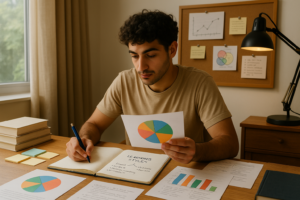Boosting Memory Power: Simple Techniques for South African Students
Introduction
Remembering study material can feel like a constant uphill battle, especially when you’re juggling multiple subjects, sports and social life. Whether you’re in Grade 10 or tackling your final matric exams, strengthening your memory isn’t just about working harder – it’s about working smarter. With the right techniques, you can retain information longer, recall it faster and walk into exams with confidence.
Understanding How Memory Works
Before diving into strategies, it’s helpful to know how memory functions. In simple terms, your brain stores information in three stages:
- Sensory memory – the quick impressions your senses pick up.
- Short-term memory – where information is temporarily stored for immediate use.
- Long-term memory – where facts, skills and experiences are stored more permanently.
The goal is to move information from short-term to long-term storage – and that takes strategic repetition, connection and active engagement.
1. The Power of Spaced Repetition
Instead of cramming the night before, spread your study sessions out over days or weeks. This “spacing effect” strengthens neural connections and makes recall easier. Apps like Anki or Quizlet can help you create flashcards that repeat information at just the right intervals.
Example: If you learn a new history fact on Monday, revise it again on Tuesday, then Friday, then the following week.
2. Teach It to Someone Else
One of the best ways to remember something is to explain it in your own words. Find a study buddy, sibling, or even a parent and pretend you’re the teacher. This forces your brain to organise the information logically, filling in any gaps in your understanding.
3. Use the Memory Palace Technique
This ancient method involves visualising a familiar location – like your home – and “placing” information along a mental path. For example, if you’re studying the steps of the scientific method, you could imagine each step as an object in a different room of your house. When it’s time to recall, you mentally “walk” through your home.
4. Link New Knowledge to What You Already Know
Your brain remembers things better when they connect to existing knowledge. If you’re learning about the water cycle, relate it to the rainstorm you experienced last weekend. Making learning personal creates strong mental hooks for retrieval later.
5. Engage All Your Senses
Multi-sensory learning improves retention. Use colourful notes, speak your study material aloud, and use real-life examples wherever possible. The more senses you involve, the stronger the memory trace becomes.
6. Prioritise Sleep and Nutrition
Your brain needs proper rest to consolidate memories. Aim for at least 8 hours of sleep and include memory-boosting foods in your diet – like avocados, blueberries and nuts. Avoid pulling all-nighters, as they can actually make it harder to recall information the next day.
7. Mind Maps for Big Picture Learning
Mind maps help you see relationships between concepts at a glance. Start with the main topic in the centre of a page and branch out with related subtopics. This not only organises your thoughts but also improves visual memory.
Conclusion
Improving your memory isn’t about luck – it’s about using proven strategies that work with the way your brain is wired. By combining techniques like spaced repetition, teaching others, sensory engagement, and healthy habits, you can boost your ability to learn and recall information. And remember – the sooner you start applying these methods, the better your results will be.




